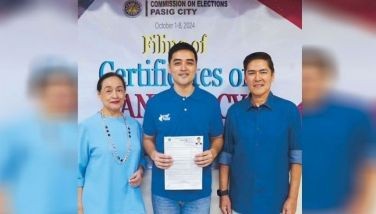DOH launches nationwide anti-measles campaign in Cebu City
February 5, 2004 | 12:00am
CEBU CITY — The Department of Health (DOH) launched here yesterday a nationwide campaign to eliminate measles amid reports that the disease has claimed the lives of four children from a tribal community in South Cotabato.
Health Secretary Manuel Dayrit said the four children belonged to the Bilaan tribe in the remote village of Simsiman in Norala, South Cotabato.
"Our people in the field are looking into that. We have this campaign to prevent incidents like this. We don’t want children to die from measles or to suffer its complications," he said.
But Dr. Milagros Fernandez, DOH Undersecretary for Mindanao, could not yet ascertain how many children in Simsiman were affected by measles and when they started getting sick. The DOH learned about the measles outbreak only last Tuesday.
Fernandez said the DOH regional office in South Cotabato sent five health experts to Simsiman yesterday morning to look into the extent of the outbreak.
This year’s campaign against measles, dubbed "Ligtas Tigdas 2004," is a follow-up to the DOH’s immunization campaign in 1998.
In launching the program here, children from the Badjao tribe in Sitio Alaska, Barangay Mambaling were immunized.
Dr. Romanus Mkeranga, head of the Health and Nutrition Section of the United Nations Children’s Fund (UNICEF), lauded the Philippines for being one of the few countries working on the elimination of measles.
While the Philippines wants to control the disease, Mkeranga said other countries are only focused on "reducing" measles cases.
According to Dayrit, it was the DOH’s idea to conduct the anti-measles program every five years, with routine immunizations at health centers in the intervening period, to ensure that all children from nine months old to eight years old are immunized.
Dayrit, however, admitted that measles could not be totally eradicated and the program is only intended to "eliminate the disease as a public health problem."
"For measles, we cannot go for eradication. What we want to achieve is to prevent any measles epidemic," he said.
The DOH, with the help of barangay health workers, will immunize 18 million children in health centers and through door-to-door vaccination. The program costs some P1 billion.
Under the program, recipients of anti-measles vaccination will also receive vitamin A supplements.
Measles is characterized by rashes, fever and cough, runny nose or red eyes and can be transmitted through droplets.
The disease kills around 300 children annually and can cause complications like pneumonia, blindness, diarrhea, reactivation of tuberculosis and encephalitis.
Annually, the government spends about P20 billion to treat measles and its complications.
Dayrit said the DOH intends to reach out to far-flung areas and indigenous communities to ensure that all children are fully covered.
He admitted that the beliefs of some minority groups against Western medicines could hamper the program.
"They don’t believe in Western medicine like vaccination. What we did was we coordinated with their chieftains until they realized the benefits of being immunized," he said.
Health Secretary Manuel Dayrit said the four children belonged to the Bilaan tribe in the remote village of Simsiman in Norala, South Cotabato.
"Our people in the field are looking into that. We have this campaign to prevent incidents like this. We don’t want children to die from measles or to suffer its complications," he said.
But Dr. Milagros Fernandez, DOH Undersecretary for Mindanao, could not yet ascertain how many children in Simsiman were affected by measles and when they started getting sick. The DOH learned about the measles outbreak only last Tuesday.
Fernandez said the DOH regional office in South Cotabato sent five health experts to Simsiman yesterday morning to look into the extent of the outbreak.
This year’s campaign against measles, dubbed "Ligtas Tigdas 2004," is a follow-up to the DOH’s immunization campaign in 1998.
In launching the program here, children from the Badjao tribe in Sitio Alaska, Barangay Mambaling were immunized.
Dr. Romanus Mkeranga, head of the Health and Nutrition Section of the United Nations Children’s Fund (UNICEF), lauded the Philippines for being one of the few countries working on the elimination of measles.
While the Philippines wants to control the disease, Mkeranga said other countries are only focused on "reducing" measles cases.
According to Dayrit, it was the DOH’s idea to conduct the anti-measles program every five years, with routine immunizations at health centers in the intervening period, to ensure that all children from nine months old to eight years old are immunized.
Dayrit, however, admitted that measles could not be totally eradicated and the program is only intended to "eliminate the disease as a public health problem."
"For measles, we cannot go for eradication. What we want to achieve is to prevent any measles epidemic," he said.
The DOH, with the help of barangay health workers, will immunize 18 million children in health centers and through door-to-door vaccination. The program costs some P1 billion.
Under the program, recipients of anti-measles vaccination will also receive vitamin A supplements.
Measles is characterized by rashes, fever and cough, runny nose or red eyes and can be transmitted through droplets.
The disease kills around 300 children annually and can cause complications like pneumonia, blindness, diarrhea, reactivation of tuberculosis and encephalitis.
Annually, the government spends about P20 billion to treat measles and its complications.
Dayrit said the DOH intends to reach out to far-flung areas and indigenous communities to ensure that all children are fully covered.
He admitted that the beliefs of some minority groups against Western medicines could hamper the program.
"They don’t believe in Western medicine like vaccination. What we did was we coordinated with their chieftains until they realized the benefits of being immunized," he said.
BrandSpace Articles
<
>
- Latest
- Trending
Trending
Latest


























